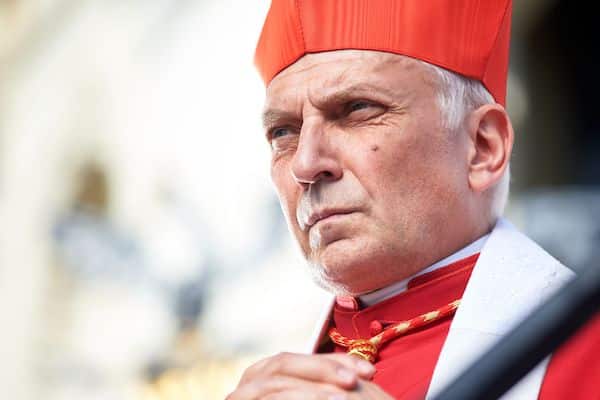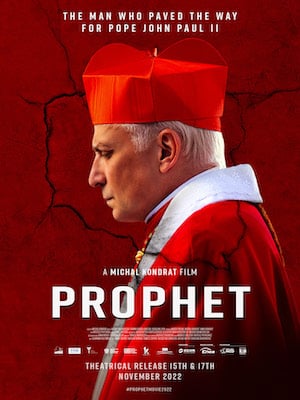I’m guessing that many Catholics in the United States are unfamiliar with the life story of Blessed Cardinal Stefan Wyszynski. That’s about to be remedied by the new film, Prophet, directed and produced by Michal Kondrat (Purgatory, Faustina: Love and Mercy). The film hits theaters as a Fathom Event on Tuesday and Thursday, November 15 and 17. Click here for ticket information.
Beatified in 2021, Cardinal Wyszynski is probably best known as the man who paved the way for Pope John Paul II. His efforts for the freedom of the Church in communist Poland are truly remarkable. Wyszynski’s work against communism could be said to have set the stage for all that Saint John Paul II did to contribute to the collapse of communism in Poland.
The film begins in 1953, when Wyszynski (Slawormir Grzymkowski), the primary bishop in Poland, known as the Primate, in an exile of sorts, is away from his diocese due to pressure by the communist government. He’d already suffered three years of imprisonment at their hands. He’s not silent, however, as he repeatedly hounds the government for basic human rights for the Polish people and for the persecution of priests and bishops to end.
Seeking to curry a bit of favor, First Secretary Gomulka (Adam Ferency) permits him to return to Warsaw where Wyszynski immediately enters into negotiations for greater freedom of worship. Gomulka agrees to his terms, wanting Wyszynski’s endorsement at the next election.
Prophet follows a historical path, highlighting significant moments in Polish history between 1950 and 1980. Each moment finds Wyszynski fighting the government, always trying to gain better circumstances for the people and the Church.
Central to these moments is the millennium celebration Wyszynski planned for the “baptism” of Poland in 1966. An invitation was made to Pope Paul VI who agreed to come but was barred by the government. An invitation was also sent to the bishops of Germany in the form of a declaration of forgiveness for the recent atrocities done to the Poles by Nazi Germany. These actions, of course, make the communists retaliate against him even more.

Some filmgoers may find the pace of the film quite slow. A tighter script and more proficient editing would have made the film move along better. However, learning about this holy man who worked tirelessly his whole life for the destruction of communism in Poland is worth enduring the film’s drawbacks.
The more personal vignettes in the film actually have more of an impact than the constant clashes between Wyszynski and the communists. Witnessing a young woman, Kazia (Karolina Bruchnicka) stealing, he intervenes and then becomes a mentor and father figure to her. He also befriends Magda (Katarzyna Zawadzka) and her husband, Janek (Michal Meyer), who are desperate to have a child. His friendship with Bishop Antoni Baraniak (Artur Krajewski), who was also imprisoned and tortured, shows the depth of his care for the flock God entrusted to him.
One thing is for certain, Cardinal Wyszynski’s faith in Christ Jesus comes through in every interaction, from encouraging fellow clergy, including the future John Paul II (Andrezej Niemty), teaching Kazia to forgive those who persecute them, to responding in tolerance and love to those who betray him. He told Kazia, “We can triumph over evil only with good and with truth.”
Information on Prophet at Fathom Events here.



